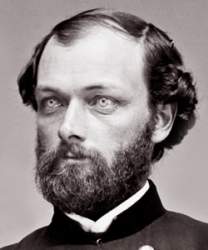Record Data
Source citation
Reprinted in War Department, et al., The War of the Rebellion: a compilation of the official records of the Union and Confederate armies. ; Series 1 - Volume XLVII , Part 3 (Washington, DC: Government Printing Office, 1896), 202-203.
Recipient (to)
Brigadier General E.D. Townsend, War Department
Type
Military record
Date Certainty
Exact
Transcriber
John Osborne, Dickinson College
Transcription date
Transcription
The following text is presented here in complete form, as it originally appeared in print. Spelling and typographical errors have been preserved as in the original.
Headquarters Department of the South, Hilton Head, S. C, April 13, 1865.
Brig. Gen. E. D. Townsend,
Asst. Adjt. Gen., U. 6'. Army, War Dept., Washington, D. C. :
General: I have the honor to acknowledge the receipt of your communication of this date informing me that the bishop of Savannah has made to the Secretary of War a bitter complaint that I have appropriated a part of a cemetery near that city for fortifications and have removed the dead interred there. You further state that you are instructed to call for a report from me, and to direct me not to interfere with any cemetery or burial ground unless under an absolute necessity for the proper defense of the city, and in such case to see that the bodies are carefully removed and properly interred in a suitable place, and, if possible, under the charge of the ecclesiastical authorities to whom the cemetery or burial ground may belong. In obedience to these instructions 1 respectfully submit the following report: The work in question was determined upon, the site selected, and the instructions given for its erection before I assumed command of the department, which was on February 9, 1865. I inclose a copy of a report of Captain Suter, of the Engineer Corps, chief engineer of the department, which sets forth in detail how, why, and when the work was ordered. After I had assumed command, and on or about March 9, 1865, Bishop Verot addressed me a complaint upon the subject. I referred this to General Grover, commanding at Savannah, directing him to act as the interests of the United States should require. As soon as possible I personally visited the cemetery and made a careful inspection of the site. I found the work well advanced. The disinterment of bodies had been about finished. All the injury which could be done had been, and an abandonment of the work would not have restored the cemetery to anything like its normal condition. Under these circumstances I ordered that each grave where disinterred remains had been or were being placed should be carefully marked; that headstones and monuments should be carefully preserved, and that when the work should be finished the grounds should be put in good order. I afterward sent my chief of staff to Savannah with orders to take Bishop Verot to the cemetery and endeavor to arrange the matter with him amicably. I had myself sought to find the bishop on the occasion of my own visit of inspection, but had failed, and my time was too much occupied to allow any long search. This officer met Bishop Verot, went with him to the cemetery, and reported that they found that all the bodies which were necessary to be taken up had been removed. Under my orders he then stated to the bishop that I would put him in possession of any suitable piece of unoccupied ground and would favorably indorse any just application which his ecclesiastical body should make for indemnity or damages. The site is an admirable one for the defensive purposes sought to be secured, but even if it had not been peculiarly well chosen, in an engineering point of view, the work had, as I have already stated, progressed so far before I personally inspected it that it would have been useless to arrest its construction. I fear that Bishop Verot's course in this matter, judging from the tenor of his conversation with my chief of staff, has been captious rather than charitable, and that a feeling of hostility to the national cause has prompted him to embarrass my action. None can regret more than myself the sad necessity which disturbs the ashes of the dead, but with the small defensive force at my command in Savannah, and in view of the rapidly approaching summer, 1 did not feel at liberty to throw down the work which was already so far advanced and locate this part of my line anew. I inclose herewith a copy of a letter addressed by Bishop Verot to myself, dated the 5th instant. I respectfully recommend that when the exigencies of the present campaign are over and the cool weather permits bodies to be again safely disinterred, this work be thrown down and the cemetery be again restored as far as possible to its old condition.
I am, very respectfully, your obedient servant,
Q. A. GILLMORE,
Major-Oeneral, Commanding.



